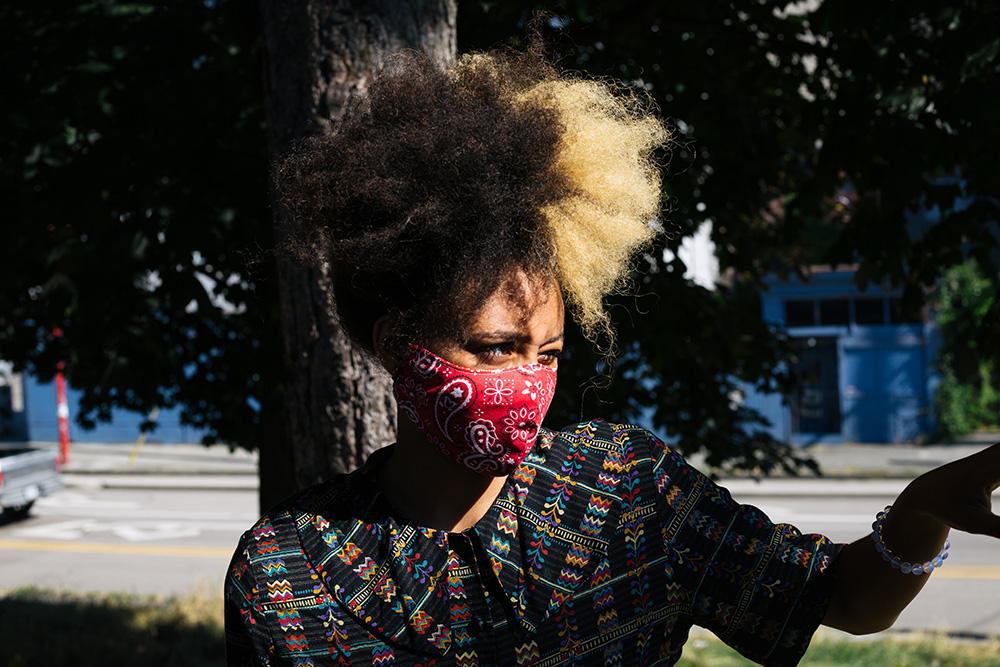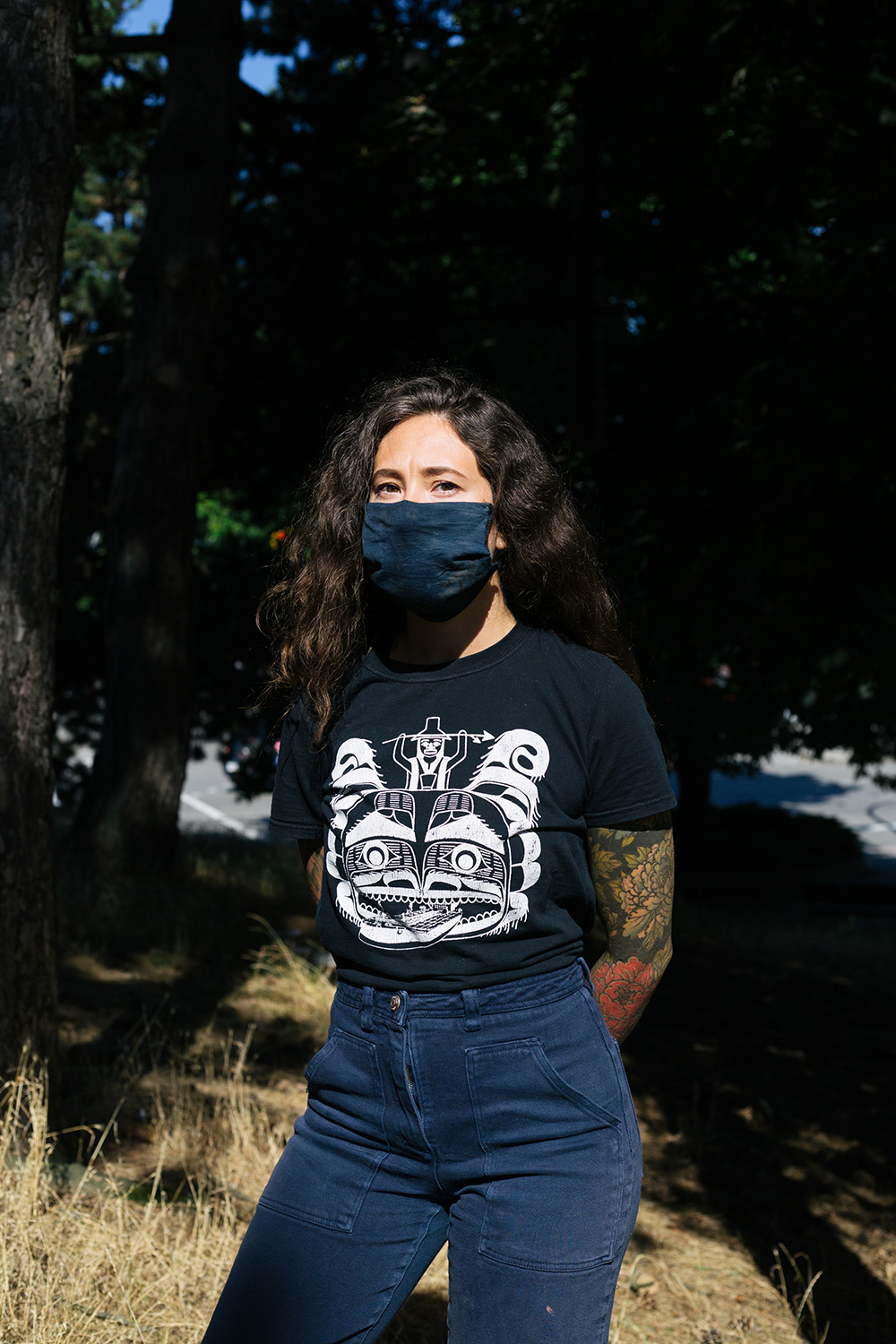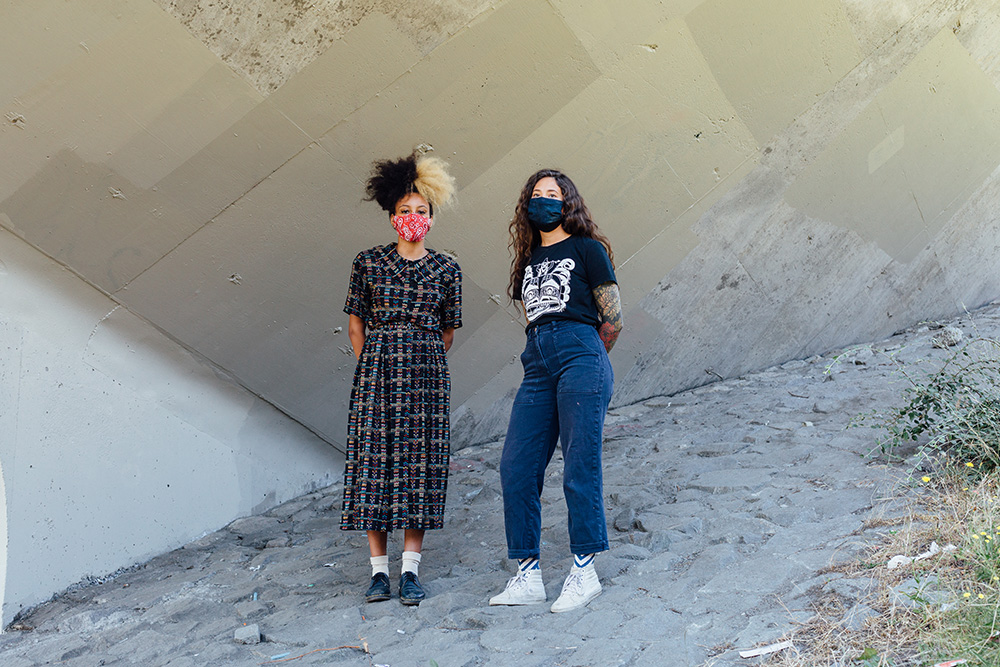Two women arrested during the Hogan’s Alley protest last month say the Vancouver Police Department jail is filthy and staff aren’t taking appropriate measures to prevent the spread of COVID-19.
Feven Kidane and Ailsa Macmillan were among seven people arrested on the Vancouver viaducts where Hogan’s Alley, the first and most prominent Black community in Vancouver’s history, once stood.
Kidane, a Black woman and jazz student, said she was shocked by conditions in the jail, where she spent six hours before being released.
The floor of her cell was littered with garbage and smeared with an unidentifiable gel, walls and floors were stained with “what looked like blood,” and the toilet was broken, Kidane said.
She says she was not provided with any soap, sanitizer or personal protective equipment, despite asking for hand sanitizer twice.
Both Kidane and Macmillan say that only a few officers and prisoners who brought their own personal protective equipment were wearing masks.
“We’re living in a pandemic at the same time as being arrested,” says Kidane. “You still have to comply with COVID restrictions, especially if you’re in the government.”
Kidane heard a prisoner in another cell complaining that he hadn’t been given toilet paper or water for 10 hours. Shortly after, they called him a nurse, who also visited Kidane and gave her a cup of juice — the only sustenance she got during her time inside, she said.
Macmillan’s experience was similar.
“The cell was dirty,” she said. “There was blood on the walls. You could tell that it hadn’t been cleaned thoroughly, especially with COVID.”
The wagon used to transport those arrested to the jail was “disgusting,” she said. “It hadn’t been cleaned. I had to ask, when we got to the precinct, to wash my hands because I didn’t feel safe with COVID happening.”
The Vancouver jail, with 52 cells on three floors, functions as a maximum-security holding facility for people who have been detained. They’re kept there until they are either released or transported to a provincial or federal correctional facility.
Stephanie Johanssen, executive director of the Vancouver Police Board, said the average stay in the jail is less than 24 hours. A February report on the jail by the solicitor general’s ministry estimated that it processes approximately 14,700 prisoners a year.
“A significant proportion (11 per cent) of these were people struggling with mental health issues, and over one-quarter (26.5 per cent) of all bookings were for people breaching the peace,” the report said.
Concerns about conditions in the jail have been raised before. In 2015, BC Supreme Court Justice Catherine Bruce ordered the VPD to provide more sanitary accommodations and proper food and bedding to terrorism suspects John Nuttall and Amanda Korody. They reported similar conditions — blood and feces on the walls and floor — during their two-night stay in the Vancouver lockup.
Vancouver police said the complaints were unfounded.
But the government report released just before the pandemic raises similar concerns, noting senior officers were “concerned by the ongoing hygiene and maintenance problems in the jail.”
“Building-maintenance issues continue to be an ongoing problem for the jail, even though jail staff routinely document concerns that are brought forward to the maintenance company,” it reported.
The report says that senior staff had to spend “a significant amount of time managing building maintenance issues including the breakdown of essential equipment... and dealing with the contracted cleaners regarding issues related to recognizing and properly cleaning biohazards” as a result.

In an emailed statement, VPD media relations officer Sgt. Aaron Roed said that the department has “strict and comprehensive infectious disease management protocols already in place at the Vancouver jail.”
“We regularly see detainees with infections like tuberculosis, meningitis, flesh-eating bacterial infections, norovirus, etc.,” he said. “The protocols allow for the protection of detainees and jail staff.”
However, he declined to release those protocols.
“The VPD jail is a maximum-security facility and release of our procedures would seriously compromise the safety of everyone in it,” he said.
Roed’s statement said detainees are offered an intake exam with a nurse who asks them questions specific to COVID-19 symptoms.
“We are continuing to provide information to frontline officers about COVID-19 and asking them to advise jail staff in advance if there is a known infectious disease issue prior to bringing a person into the jail so that safety protocols can be followed,” he wrote.
The VPD rents space for the jail in a building owned by the provincial government. It shares the costs of running the facility with the province.
A company called Rockdoc is responsible for providing medical care in the facility. When asked for an interview, Rockdoc vice-president Kaitlyn Burke declined to comment as “all requests for media must go through the VPD.”
The police board’s 2018-19 annual report says “the Vancouver jail has two nurses on duty at all times in addition to a nursing supervisor during weekdays, a physician each day for a few hours to do ‘rounds,’ as well as a full-time on-call physician.”

Jennifer Metcalfe is executive director of Prisoners’ Legal Services, a legal aid clinic for people in prisons. She says there is a lack of oversight for municipal and RCMP jails in B.C., including the Vancouver jail.
“There’s nobody that really has oversight to make sure public health is happening and that people’s human rights and charter rights are being protected when they’re in city cells,” she says.
She encourages everybody who passes though or works in B.C. jails to “listen to Dr. Bonnie Henry” for the remainder of the COVID-19 pandemic.
“Hygiene, cleaning, having masks and gloves is really important, maintaining social distancing — these are all the public health recommendations, but those are very difficult to achieve in a jail or a prison environment,” she says.
“The nature of city holding cells is that people are in and out on short stays. We know that the virus can stay on surfaces for a certain amount of time, so having somebody going into a cell that hasn’t been appropriately cleaned between residents would put people at risk, especially if there are biohazards like blood.”
Meenakshi Mannoe, criminalization and policing campaigner for Pivot Legal Society, echoes these sentiments.
“There’s a very high risk in an environment like a detention centre, because you have no control over your environment. You can’t safely social distance. It’s a mass congregation,” she says.
In April, Pivot Legal Society wrote to the Vancouver Police Department to “raise concerns about people being taken into custody, recognizing that there have been a number of COVID outbreaks at federal prisons across Canada, including Mission Institution in B.C.”
“We highlighted the need for the VPD to minimize contact with the criminal justice system,” Mannoe says. Pivot urged police to work with the provincial Ministry of Public Safety and community-based organizations “to reduce the number of people awaiting trial and remand or preventative discussion in pre-trial and preventative correctional institutions.”
It also requested “that the VPD provide COVID-19 protocols for Vancouver jail as well as COVID-19 protocols for the detention and transport of individuals to VPD and non-VPD facilities like hospitals.”
Pivot has recommended that the VPD reduce the time people are spending in custody, enforce a series of health-related restrictions, and release people from custody as quickly as possible after they’re detained.
In correspondence with Pivot, the Vancouver Police Board stated that the average number of detainees had fallen by over 35 per cent “due to considerable effort on the part of VPD officers to minimize the number of persons detained in respect of the health challenges jail facilities provide.”
“But we know that from Crab Park and from the Hogan’s Alley Blockade that large numbers of people were arrested,” says Mannoe, who works with people detained at protests. “People are very concerned about COVID transmission in correctional settings, as they should be because there have been massive outbreaks.
“It’s important to remember, especially when we are talking about people who are incarcerated at demonstrations, that generally speaking they are folks who experience constant surveillance and detention in the Downtown Eastside,” she says. “They have complex, compounding health issues that are exacerbated by poor health care in jail.”
Mannoe says the conditions reported by Macmillan and Kidane are considered “the norm” in the Vancouver jail by people who are regularly incarcerated.
“There’s just a general understanding in activist communities that if you’re going to jail, you’re going to be treated badly,” she says. “People can try to get their medication in a prescription bottle, and officers can just make the arbitrary decision to take that away or ignore it.”
Kidane was denied access to her prescription throughout her six hours in the cell, she said.
Mannoe emphasizes that the state of jails has a particular impact on people who are routinely criminalized.
“When you are going out of your way to arrest and surveil and criminalize Black people, Indigenous people, people who use drugs, people who have mental health issues; racism, prejudice, stigma is going to inform the types of systems and infrastructure that’s available to them, so people are not being treated well, even in short-term facilities like Vancouver jail,” she says.
“It’s not fair to say that’s unique. It’s a really systemic issue.” ![]()
Read more: Rights + Justice, Coronavirus, Municipal Politics
















Tyee Commenting Guidelines
Comments that violate guidelines risk being deleted, and violations may result in a temporary or permanent user ban. Maintain the spirit of good conversation to stay in the discussion.
*Please note The Tyee is not a forum for spreading misinformation about COVID-19, denying its existence or minimizing its risk to public health.
Do:
Do not: